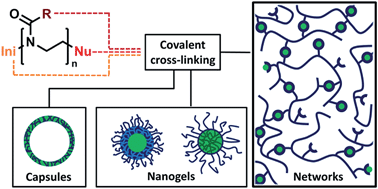Covalently cross-linked poly(2-oxazoline) materials for biomedical applications – from hydrogels to self-assembled and templated structures
Abstract
Covalently cross-linked polymeric materials play an important role in life science. Hydrogels produced from multifunctional polymers can be utilized in numerous (bio)applications, such as drug delivery, tissue engineering and (bio)sensing. Also nano-/micro-scale assemblies benefit from a covalent linkage for instance to prevent premature disassembly or to generate a passive tissue specificity when used as a drug delivery agent. In both cases there is a need for biocompatible polymers with manifold (orthogonal) functionalization possibilities. By using the cationic ring-opening polymerization of 2-oxazolines it is possible to accomplish both tasks. In this review we summarize covalently cross-linked structures consisting of poly(2-oxazoline)s including three dimensional scaffolds, micellar systems as well as multilayer capsules. We focus on the cross-linking chemistry and the impact of the addressed systems regarding biological application.

- This article is part of the themed collection: 2015 Journal of Materials Chemistry B Hot Papers

 Please wait while we load your content...
Please wait while we load your content...